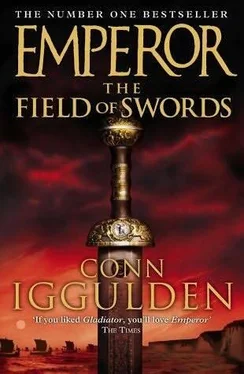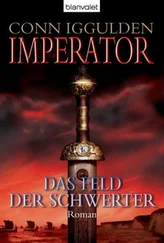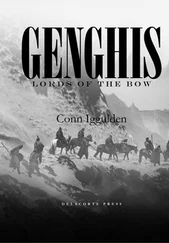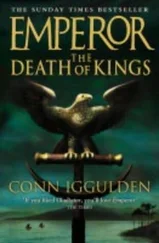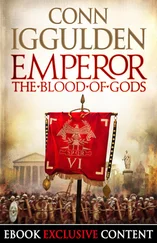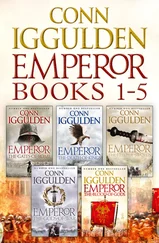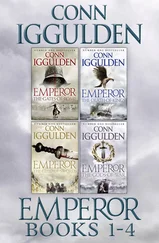“I may be worse than Ariovistus, my friend,” he whispered.
Mhorbaine’s eyes were black in the night as he forced a smile onto his hard face. Though he left omens to his druids, he feared for his people now that such a man had entered Gaul. Mhorbaine had offered his cavalry to bind the legions to his people. To keep the Aedui safe.
“Perhaps you will be; we will know in time. If you march against him, you must bring him to battle before winter, Julius. After the first snow, the year is over for warriors.”
“Can your winter be so terrible?”
Mhorbaine smiled mirthlessly. “Nothing I can say will prepare you, my friend. We call the first moon ‘Dumannios’-the darkest depths. And it gets colder after that. You will see, when it comes, especially if you travel farther north, as you must to defeat my enemies.”
“I will have your cavalry to command?” Julius said.
Mhorbaine looked him in the eye. “If we are allies,” he said softly.
“Then let us make it so.”
To Mhorbaine’s astonishment, Julius drew a dagger from his belt and gashed his right palm. He held out the blade.
“Bind it in blood, Mhorbaine, or it is not bound at all.”
Mhorbaine took the blade and cut his own palm, allowing Julius to take the wounded hand in a firm grip. He felt the sting of it and wondered what would come of the bargain. With his cup, Julius gestured to the red planet above them.
“I swear under the eye of Mars that the Aedui are named friends. I swear it as consul and general.”
Julius let the hands fall apart and refilled their cups from the amphora he cradled in his lap.
“There, it is done,” he said.
Mhorbaine shuddered and, this time, drank deeply against the cold.
Pompey leaned on the white marble balcony of the temple to Jupiter, the vast space of the forum stretching away below him. From the top of the Capitol, he could gaze on the heart of the city, and what he saw displeased him immensely.
Crassus showed nothing of his private amusement as he too looked over the swelling crowds. He kept his silence as Pompey muttered angrily to himself, turning at intervals to point out some newly infuriating aspect of the scene.
“There, Crassus. Can you see them? The bastards!” Pompey cried, pointing.
Crassus looked past the quivering finger to where a long line of men in black togas wound their way from one side of the forum toward the Senate house, pausing at intervals to burn incense. Over the wind,
Crassus thought he could hear the sound of the dirge that accompanied their steps, and it was all he could do not to laugh as Pompey stiffened at the wailing notes.
“What are they thinking to be mocking me in this way?” Pompey shouted, purpling with rage. “The whole city to see them in their mourners’ cloths. By the gods, they will love to see it. And what will we have as a result? I swear, Crassus, the people will use the Senate’s disobedience as an excuse for riots tonight. I will be forced to declare another curfew and again I will be accused of ruling without them.”
Crassus cleared his throat delicately, taking care to choose his words. Below, the long line of senators paused in sequence as incense billowed out of golden censers against the breeze.
“You knew they could rebel against our agreement, Pompey. You told me yourself that they were growing fractious,” he said.
“Yes, but I did not expect such a public display of disorder, for all the trouble they have been giving me in the Curia. That fool Suetonius is behind part of it, I know. He courts that trader Clodius as if he were something better than the gang leader he really is. I wish you had broken him properly, Crassus. You should see the way they discuss and scrutinize my legislation. As if any of them have been senators for more than the blink of an eye. It is insufferable! At times, they make me want to take the powers they accuse me of. Then we would see something. If I were made Dictator, even for six months, I could root out the dissenters and remove this… this…” Words failed him as he swept an arm at the forum below. The line of senators was nearing the Curia building, and Crassus could hear the crowd cheering their stand against Pompey.
Crassus had no sympathy for his colleague. Pompey lacked the subtlety to massage his opponents, preferring to use his authority to batter the Senate into obedience. Privately, Crassus agreed with many of the other senators that Pompey already acted as Dictator over a city that was quickly losing patience with his autocratic style.
In the distance, the procession reached the steps up to the Curia, and Crassus saw them pause. They played a perilous game in angering Pompey in such a way. Their mocking funeral for the death of the Republic was intended as a public warning, but the last embers of democracy could indeed be crushed if Pompey lost all restraint as a result of it. Certainly, if riots ensued, Pompey would be within his rights to clamp down on the city, and once pushed so far, Dictatorship was not such a great leap for him. If he declared himself in that position, Crassus knew only a war would wrest it from his hands.
“If you can see past your anger for a moment,” Crassus began gently, “you must realize that they do not want to force you further than you have already gone. Is it too much to reestablish the elections you have stopped? You have your creatures now as tribunes of the people. Could you not allow the voting again on future positions? That would take some of the sting out of the demonstrations against you, and at least gain you time.”
Pompey didn’t answer. The two men watched the senators disappear inside the Curia and the distant bronze doors swing closed behind them. The excited crowds remained, milling and shouting under the grim eyes of Pompey’s soldiers. Though the funeral procession had ended, the younger citizens especially had been infected by the display and were reluctant to leave. Pompey hoped his centurions would have the sense not to be too harsh with them. With Rome in that mood, a riot could spring from the slightest spark.
At last, Pompey spoke, his voice bitter. “They blocked me at every turn, Crassus. Even when I had the whole Senate with me, the whoreson tribunes stood up and vetoed my legislation. They set themselves against me. Why should I not put my own men into their positions? At least now I don’t have my work ruined for some petty point or whim.”
Crassus looked at his colleague, noting the changes in him over the previous year. Dark pouches had swollen under his eyes and he looked exhausted. It had not been an easy period, and with the citizens testing the strength of their leaders, Crassus was pleased enough to be free of the constant wrangling.
Pompey had aged under the responsibility and Crassus wondered if he secretly regretted the bargain he had struck. Julius had Gaul, Crassus his fleet of ships and his precious legion. Pompey had the struggle of his life, begun on the first day in Senate when he had forced through a bill with Julius’s proxy.
The Senate had borne the change in power well enough at first, but then the factions had begun to form, and with new men like the merchants Clodius and Milo entering the Senate, it had become a dangerous game for all of them. Rumors had spread that Bibilus had been killed or mutilated, and twice the Senate had demanded he be shown alive to them and made to explain his absence. Pompey had allowed them to send letters to the consul, but Julius’s word had been good. Bibilus had not come and visitors to his house found it barred and dark.
After two debates had come close to violence, Pompey had his soldiers stand guard over the sessions, ignoring the protests of the senators. Now they paraded their dissatisfaction in front of the people, making the dispute public. Though Crassus found Pompey’s fury amusing, he worried for what would come of it.
Читать дальше
Конец ознакомительного отрывка
Купить книгу
